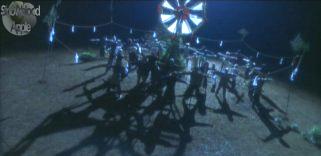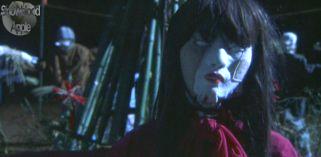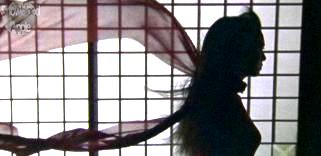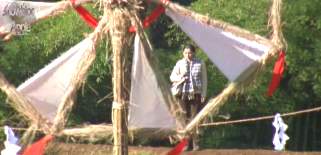Junji Ito sub-menu: Kakashi Long Dream Lovesick Dead Tomie Tomie: Re-birth Uzumaki |

Review
©
Mandi Apple, 2002 |
|||||||||||||||||
|
Directed by Norio Tsuruta, 2001, 86 min. starring Maho Nonami, Kou Shibasaki, Shunsuke Matsuoka, Grace Ip, Kenzo Kawarazaki, Lily, Yoji Tanaka, Yoshiki Arizono and Mizuho Igarashi. Based on the Junji Ito manga 'Kakashi’from the comic titled "The Face Burglar".
Kakashi (literally ‘Scarecrow’) is another movie based on the brilliant manga of Junji Ito, the world’s leading modern horror manga writer, and if you’ve previously read some of my other reviews of Ito adaptations, you’ll realise that this means that such films can either be wonderful, enriching, enlivening and faithful (see Uzumaki) or dull, tedious, boring, action-free and godawful (see Tomie). Kakashi seems to occupy a middle ground between the two: painfully slow-moving and frustrating throughout the first half, picking up speed and tension by the beginning of the second half. Brought to you by Norio Tsuruta, the director of Ring 0:Birthday, this film seems to follow in his usual style of film-making: it ain’t really horror, more a tense, offbeat, romantic tragedy with a few chilling bits thrown in now and again. The cinematography is aesthetically beautiful, the locations awesome, the acting pretty good quality throughout (fans of Battle Royale will no doubt recognise the gorgeous Kou Shibasaki, who gives an equally evil and brilliant performance in this film), and a special shout-out for the music composer, Shunichiro Ogata, who has given Kakashi a totally swoonworthy soundtrack. But all that aside, Kakashi simply does not work as a horror film. Whereas Ring 0:Birthday just scrapes by with the skin of its teeth to make it into the horror category, Kakashi really doesn’t make the grade. I’m not saying you shouldn’t see it, in fact I highly recommend watching it, but don’t expect to be scared, because it won’t happen. There’s no real tension, no shocks, no surprises; everything has a surreal, dream-like quality of the fantastic that doesn’t really work very well for the film, because if it’s not really happening, who the heck cares?! It's beautiful, it's dreamy, it's sad - but it's not horror.
Synopsis “Is this a dream… or a fantasy?” At the beginning of the film, there’s a brief explanation of the legend of how the ‘Kakashi’ came to exist: that in ancient times, Japanese farmers would burn human and animal hair, to keep away wild animals and evil spirits. This practice was known as ‘kagashi’. When it was later thought that burning effigies of humans would do the same thing, not only keeping out the undesirables but also attracting the gods down to earth, the effigies were named ‘kakashi’ in honour of the old tradition. However, as the legends would have it, the farmers were unaware that the gods they were attracting were pretty similar to the kind of spirits they were trying to keep away – unkind gods with no sympathy for humanity. And so onto the central theme of the film, mainly concerning a young woman, Kaoru Yoshikawa (played by Maho Nonami), and her slightly weird relationship (well, is it just me or do they seem a bit overly close?!) with her brother, Tsuyoshi (Shunsuke Matsuoka). Tsuyoshi has been missing for a week, and the film opens with Kaoru searching Tsuyoshi’s Tokyo apartment for clues to his whereabouts. She finds a strange envelope next to his phone, which has a letter in it and some bits of straw: the letter is from an ex-schoolfriend of hers and an ex-girlfriend of Tsuyoshi’s, Izumi Miyamori (played delightfully by Kou Shibasaki, perhaps the only scary thing about Kakashi!). The letter itself is pretty odd: she begs Tsuyoshi to come and see her as she is afraid and needs help, and says (a quote which pops up throughout as the film’s obvious motto), “…is this a dream… or a fantasy?”
So Kaoru checks out the address on the letter, sent from a tiny rural village called Kozukata, immediately assumes that that’s where her brother has disappeared off to, and decides to go and search for him there. She drives to the spot on the map, but can’t find the way through to the village. Whilst looking around, she sees a poster for a missing girl named Sally Chen, just before she discovers there’s a old tunnel leading through to the isolated village. However, while driving up this ‘spooky’, rather clichéd tunnel, her car breaks down, leaving her on foot for the rest of the journey. Walking in the tunnel, she hears weird laughter and footsteps behind her, which scare her silly. Once out of the tunnel, she spots a strange-looking farmer, Noyi (Yoshiki Arizono), loading up the back of his pickup truck with lots of scarecrows, and tries to ask him for help. However, he won’t talk to her or offer any help, other than to tell her that there is a Kakashi-festival about to happen in the village. (These really do take place in some modern-day Japanese towns and villages, like a kind of Mayday celebration.) Clearly the inhabitants of Kozukata are insular and pretty hostile to strangers. So Kaoru walks on, bumping into odd and unsettling characters along the way, until she reaches the village centre itself, which is all decorated with scarecrows, corn dolls and red-draped windmills, but completely silent. Just two people are there: a little girl called Ayumi (Mizuho Igarashi) looking at flowers with a young woman who Kaoru recognises as Sally Chen (played by Grace Ip). All at once, Noyi the farmer reappears, bundling his daughter Ayumi into the truck, telling her not to talk to ‘outsiders’ and driving off. Sally has run off in the meantime due to all the fuss.
Kaoru eventually stumbles upon the address given in the letter, and an old woman answers the door to her, who turns out to be Izumi’s mother, Yukie Miyamori (played by Lily). However, she’s just as hostile and unhelpful as the rest of the villagers, especially when Kaoru tells her who she is and that she’s looking for Izumi. Then Izumi’s father, a doctor called Kozo Miyamori (Kenzo Kawarazaki), intercedes, brings her into the house, and tells her that Izumi is away in the special clinic in the village, but will return soon. As by now it’s getting dark and Kaoru’s car is broken down, Miyamori-san allows Kaoru to stay overnight with them. He also tells her that he and his wife had to return to Kozukata for Izumi’s sake, at which point a strange rumbling sound like thunder occurs, which seems to shake the village on a regular basis. However, whilst Kaoru is in bed, she overhears an odd conversation between the Miyamoris, and has a weird dream: in it, she creeps out of the house and into the barn next door, where she finds a kakashi with human hair on its head, dressed all in red, just as the village is decorated all in red. (Traditionally, red is a colour associated with evil and anger: anyone who was driven by someone to commit suicide would kill themselves all dressed in red, to ensure that they would return as an ‘angry ghost’ to take vengeance on that person.) She also sees the shadowy figure of Izumi sitting on the stairs, also all dressed in red… The
next morning, Miyamori-san and Kaoru go into the village to get
her some help with fixing her car; while she’s waiting, she
spots Sally going into the town hall, so she follows her. She finds
her in the financial accounts department, where she’s looking
after a strange, slow old man who turns out to be her father. But
just as she’s about to get some answers, a policeman (Yoji
Tanaka) comes in and takes her off to the police station to ask
her some questions about what she’s doing in Kozukata. When
she explains that she’s looking for her brother, he tells
her there’s been no reports of any new strangers in town,
and that the Kakashi-festival is taking place the next night.
So, why doesn’t this film work better? Well, I don’t exactly know, but I’ve read a lot of bad reviews of it, so clearly I’m not alone in thinking that there’s something not quite right about it. It’s certainly worth watching: at times, it’s reminiscent of The Wicker Man, The Children of the Corn and Deliverance (check out the cast of leering, lumbering rural villagers glaring at the ‘outsiders’ to see what I mean!). But it’s just not frightening enough. The scenes with the scarecrows put me horribly in mind of a million Z-grade zombie flicks and are pretty funny – they just look like poorly-paid extras in poorly-made masks. Higuchinsky’s amazing Uzumaki worked so brilliantly because it looked and felt just like the manga; it seems to me that the more Tsuruta tried to get away from the manga aspects, the more ‘cartoony’ and unreal the whole movie became, and not in a good way. That said, the atmospherics of Kakashi are great: there is a genuinely strange feeling about the silent and hostile village, the peasants carrying the kakashis from the fields to the village centre, the shrine of Izumi, and the rest. However, it’s not in the slightest bit eerie: it feels as though we’ve seen all this before – the isolated village cut off from the rest of the world, the pitchfork-wielding outsider-hating peasants, even the corn dolls at midnight. It’s all a little predictable. The
one really positive thing that shone through was the real
story at the heart of the film, and it’s a sad one, put across
very well: that the villagers have all stayed or come back to Kozukata-mura
because they’re trapped by grief and mourning for their dead
loved ones, so much so that they live for nothing but their memories,
desperate to have their dearly departed back with them. That is
the only grim and horrible message in Kakashi, and one
which will stay with you long after watching it.
Snowblood
Apple Filmographies: |
|||||||||||||||||
|
text,
webdesign (c) 2002 M. Apple. All characters, situations and images
remain the property of their respective owners. The
text and webdesign of this site may not be copied, reproduced, mirrored,
printed commercially or ripped off in any other way. Do not hotlink
directly to images hosted on this site.
|
|||||||||||||||||





















